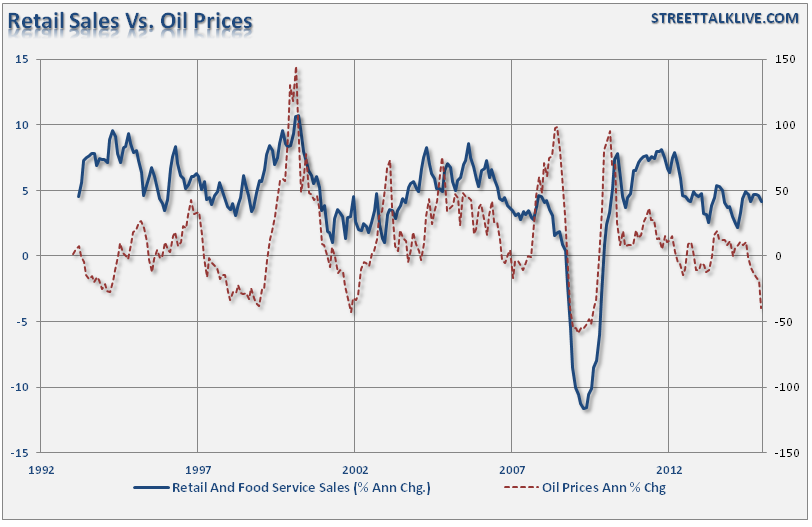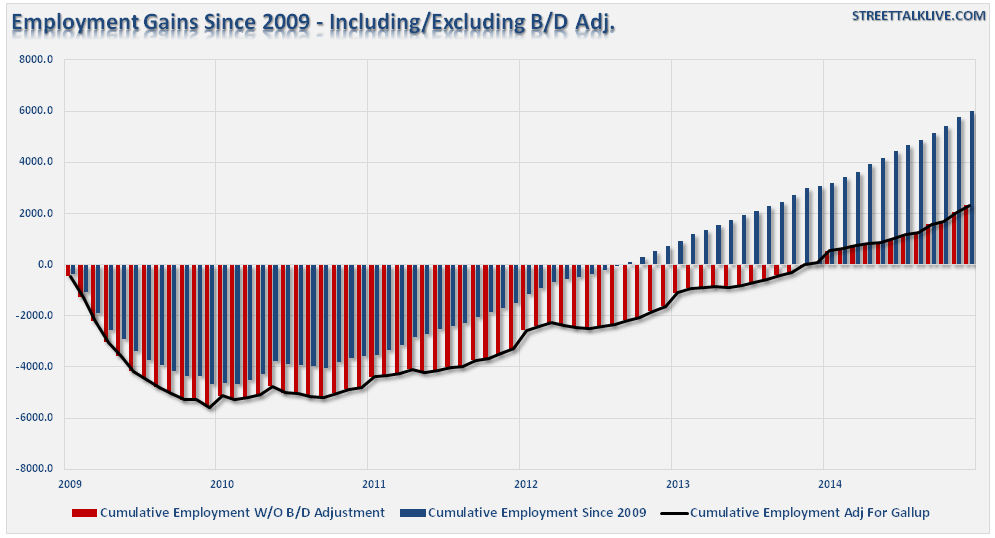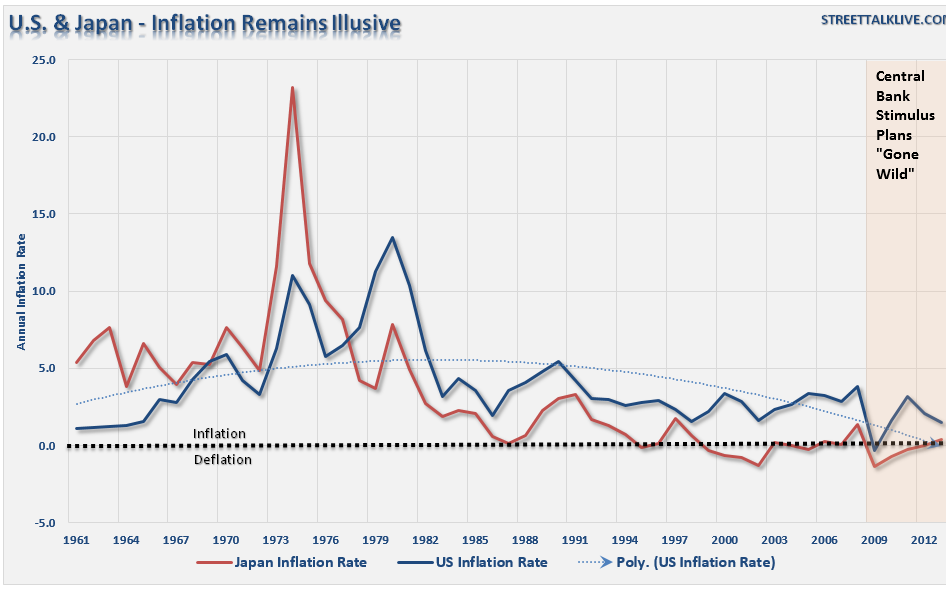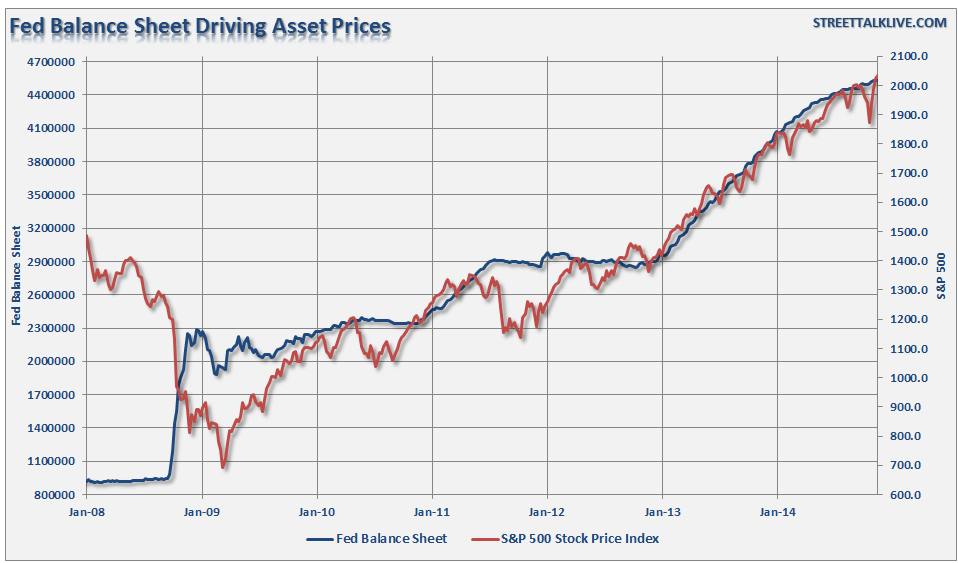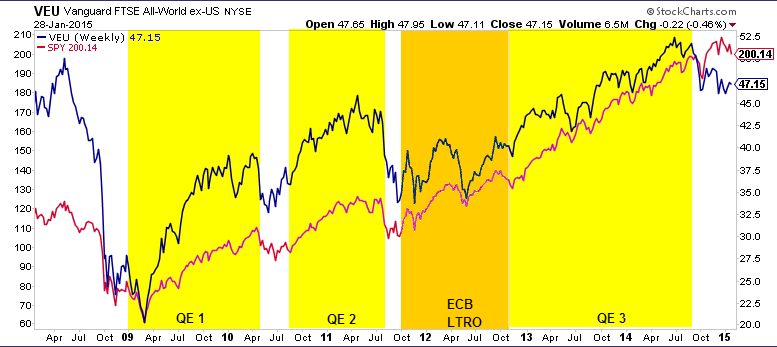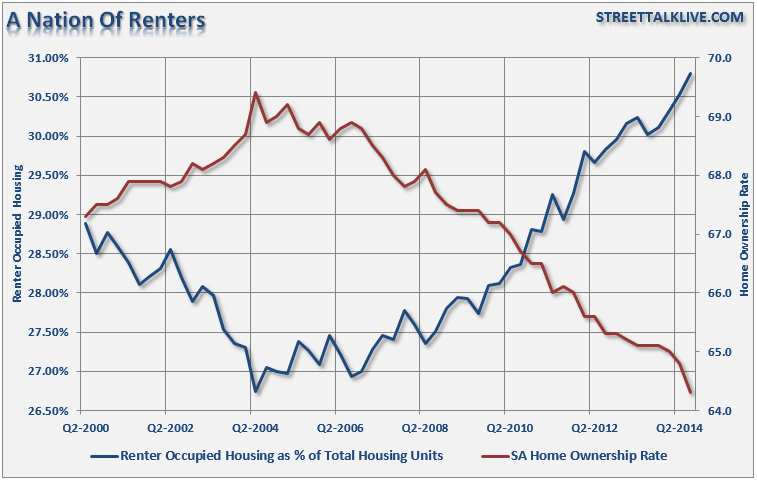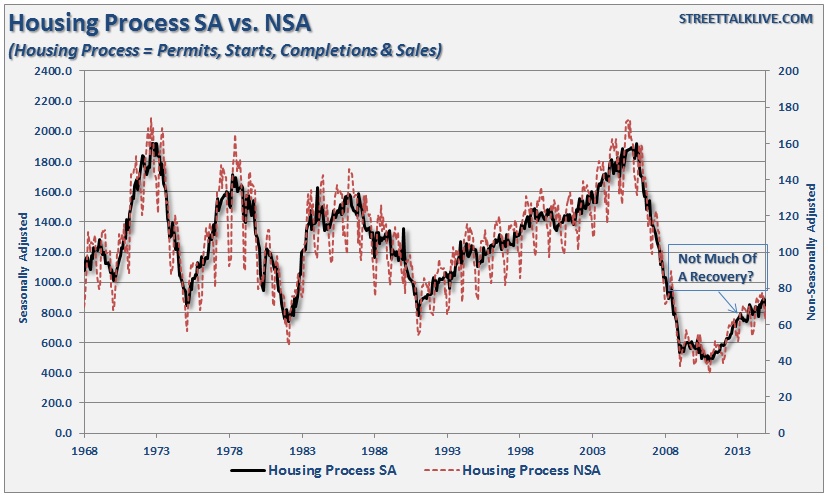The Fed May Be Making A Mistake
On Wednesday, the Federal Reserve made their latest monetary policy announcement. Janet Yellen, the current Chairwoman, made several statements that led the markets to believe that they remain on course for increasing the overnight lending rate this year.
FED SAYS ECONOMY HAS BEEN `EXPANDING AT A SOLID PACE FED CITES `STRONG JOB GAINS' AND LOWER UNEMPLOYMENT RATE FED SAYS INFLATION EXPECTED TO DECLINE FURTHER IN NEAR TERM
However, the real state of economic expansion, as discussed Wednesday, is highly questionable as the global deflationary forces have already begun to wash back onto domestic shores. While the Federal Reserve stated they were not worried about the decline in oil prices, as it boosts disposable household incomes, it is a point that they should reconsider since there is little evidence supporting that claim.
In addition, the strong job gains, as examined earlier this week are also quite suspect. Given that the employment numbers are likely extremely overinflated, which accounts for the extremely low labor force participation rates and declining wage growth, the negative feedback loop to employment could occur very quickly.
The real concern for investors and individuals is the actual economy. There is clearly something amiss within the economic landscape, and the ongoing decline of inflationary pressures longer term is likely telling us just that. The big question for the Fed is how to get out of the potential trap they have gotten themselves into without cratering the economy, and the financial markets, in the process.
It is my expectation, unless these deflationary trends reverse course in a very short order, that if the Fed raises rates it will invoke a fairly negative response from both the markets and economy. However, I also believe that the Fed understands that we are closer to the next economic recession than not. For the Federal Reserve, the worst case scenario is being caught with rates at the "zero bound" when that occurs. For this reason, while raising rates will likely spark a potential recession and market correction, from the Fed’s perspective this might be the “lesser of two evils.”
The ECB’s QE May Lead To Further Declines In euro Equities
There is much hope that the ECB’s newly minted QE program of €60 billion a month will be the spark that creates inflation in the eurozone, sparks economic growth and boosts asset prices. It is a lofty objective to say the least, considering there is very little evidence that QE programs either create inflation or economic growth. A quick look at Japan and the U.S. suggests that the ECB will likely be disappointed on both counts.
However, when it came to asset growth, the Federal Reserve was very successful, as the liquidity that was pumped into the system was recycled into the financial markets. As I have shown many times in the past, there was a high degree of correlation between the expansion of the Fed’s balance sheet and the S&P 500 index.
The reason this worked in the U.S. was because the excess reserves created by the quantitative easing program yielded a positive interest carry. This is not the case in the eurozone where the reserves created by the bond buying program with the ECB are held with a negative interest rate. This makes the program much less attractive to sellers of the bonds.
However, there is another issue that was recently pointed out by the very smart gentlemen at GaveKal Research:
“When we overlay the MSCI Europe, we find a somewhat surprising relationship-- equities have risen as the central banks' assets have contracted over the last several years, implying that asset purchases (inverted on the following chart) could actually be negative for stocks:”
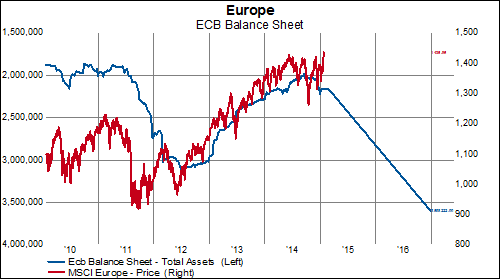
“We have no way of knowing for sure whether or not this pattern will hold, but this chart would seem to suggest that MSCI Europe equities could decline ~30% by the end of 2016.”
Given that the majority of the eurozone is either near or in recession, there is little reason to hope that a QE program the size that is being suggested by the ECB will be effective. However, there is currently little evidence that investors should be betting heavily on a resurgence of international asset prices. As shown in the chart below the correlation between domestic and international equities has been quite high and more correlated to the Federal Reserve’s repetitive QE programs.
With the domestic markets now struggling due to lack of liquidity, it is unlikely that international equities will provide any safety net for investors. Of course, while the mainstream media may be telling you to keep investing in stocks, it is clear that the “smart money” has been heading into the safety of bonds.
Low-Interest Rates Failing To Spark Housing Recovery
Dr. Ed Yardeni penned an interesting note recently stating:
“In particular, US exporters could suffer if the greenback continues to strengthen. However, that could be offset by stronger US consumer spending and home building.”
There is currently little evidence that US consumer spending is getting stronger. But the point I want to address today is this continued hope for a revival of home ownership in the U.S. That hope is grounded in the belief that if more people buy homes, not even considering whether they can afford it or not, it will boost the economic recovery. This has been one of the points that the Federal Reserve has pointed to in supporting their monetary interventions.
However, despite abnormally low interest rates, home ownership rates in the U.S., as I showed in “Housing, Not Much Recovery,” have fallen markedly while renters now make up the majority. The percentage of apartments, relative to total new home construction, is near the highest levels on record which explains the chart below.
More importantly, given that the Federal Reserve has spent the last six years artificially suppressing interest rates to boost borrowing and home buying, it has been of only marginal success. Considering the trillion’s of taxpayer dollars spent on bank bailouts, TARP, mortgage fraud forgiveness, HAMP, HARP, etc., the results are quite disappointing.
Now, with the Fed set to start raising interest rates, the collapse in energy prices, and rising concerns about financial market stability, don’t be surprised to see housing activity beginning to slow in the months ahead.
Real estate related investments are already far ahead of the underlying activity as investors have chased “yield and hope.” Both of those reasons are quite devoid of fundamental realities that have subsequently tended to have a nasty bite when ignored.
Disclaimer: "3 Things" is a weekly publication of ideas, usually contrarian, to provoke thoughtful discussions and decision-making processes. As a portfolio strategist, I am sharing things that I am considering with respect to current investment models and portfolio allocations. Please feel free to email with your comments and ideas.

